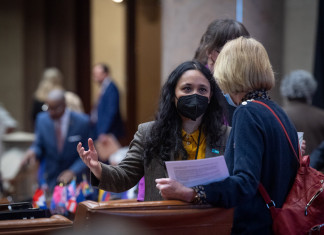As towns and counties head into budget season, they’ll have one more challenge to contend with: the property tax cap for 2014 has been lowered from 2 percent to 1.66 percent as the result of a drop in the inflation rate.
Of course, with exemptions, many municipalities have been able to create budgets that exceed the state-mandated cap on increases but are still technically considered compliant. And they can also vote to override the tax cap, after a public hearing and a local law to enact the override.
Town officials in Red Hook, Milan and Rhinebeck are already seeing tough choices ahead for their 2014 budgets. And so too is the Dutchess County Executive.
“Quite frankly, with a threshold like this, I don’t think that there is any hope that we can face the budget ahead without override. So I think the board needs to be prepared to do that or at least discuss it very soon,” Red Hook Supervisor Sue Crane told the Town Board at a recent meeting.
“The local people are the ones that are involved in volunteering by the hundreds to help us get work done in the community and we’re effective about it at a very low price, low cost to the taxpayers. And how [the state] think[s] they can continue to push down and push down and expect us to cut and cut and cut without devastating impacts, I have no idea,” she added.
Councilman Jim Ross added, “We don’t like the override, but I don’t see how we cannot do it this year, particularly as we have to start making payments on our highway garage construction, on bond payments and so on. And we’ve basically, at this point, cut all departments to the point that there really isn’t much more to eliminate.”
He recalled that the 2013 budget was much lower than the previous year’s, but due to the loss of other revenue sources, the tax levy still had to be increased in order to meet the costs. Red Hook’s increase to the tax levy was 2.43 percent in 2013, just under the tax cap once exemptions had been factored in. However, a state comptroller’s audit found that the town had actually exceeded the cap by .33 percent due to an error.
“At budget time last year, if you recall, our budget was considerably lower than the prior year but we were still bumping up against the 2 percent [cap] just because of loss of revenue. Now, if the economy turns around and our revenue picks up, that would be the really only saving grace, because there is no more fat to cut,” Ross said.
In Milan, Supervisor Bill Gallagher pointed out that costs for towns and other municipalities are only increasing, which makes staying under any cap, particularly a low one, much harder.
“It’s going to be tough to meet, with budget time coming up. … With 30 percent increase in our retirement costs and 7.5 percent increase in our medical costs, it’s going to be awful tough to stay under the cap,” he told The Observer. Milan exceeded the tax cap in 2013 with a budget levy of 3.7 percent.
The Town of Rhinebeck managed to stay under the tax cap, with a 1.86 percent increase for 2013, but used $366,000 from its fund balance to cover budget needs.
Deputy Supervisor Bruce Washburn noted that the tax cap is supposed to help municipalities to optimize cost-effectiveness and sustainability for their essential services.
“Towns need to evaluate service delivery methods along with the ability and willingness of constituents to pay for them, then adjust processes and fees accordingly. We’ve been doing that in the Town of Rhinebeck for several years,” Washburn said.
“If we step up and act pragmatically, then we can conceptually stay under the cap for 2014 while continuing to reduce reliance on fund balances,” he added.
The property tax cap was enacted in 2011 by Gov. Andrew Cuomo and the State Legislature — including then State Assemblyman Marc Molinaro, Dutchess County’s current County Executive — as part of the state’s strategy to reduce costs to taxpayers and rein in government spending.
Molinaro told The Observer that he would not rule out a tax cap override for the 2014 county budget. “It will be exceptionally difficult to stay under the tax cap this year,” he said.
Instead of an override, which he would prefer not to do, Molinaro suggested that the county’s budget gap could be fixed with mandate relief from the state.
“When Governor Cuomo proposed the tax cap, it was the commitment of the state legislature at the time to not only move forward with the cap but to subsequently move forward with mandate relief,” Molinaro said. ” …Unfortunately, since my vote for the tax cap…the state legislature still has not moved on any meaningful mandate relief.”
“We continue to feel the pressure of rising costs with limited, if any, real relief. That will continue to force government at all levels to eliminate services that individuals rely upon,” Molinaro added. “… It’s the elimination of domestic violence programming, child abuse programming, law enforcement, 911 services, farmland protection. That’s what’s left. If you eliminate those, that’s a repeal of contracts with not-for-profits that provide those services and it’s the elimination of jobs. It’s not our desire to do it,”
For its 2013 budget, the county did not exceed the tax cap, with a tax levy increase of 2.1 percent.
Villages will also be subject to the new 1.66 percent cap when they work on their budgets next spring. While there is no official word yet on whether schools will have to grapple with the lower tax cap, it is expected to be close to 1.66 percent when the State Comptroller sets it early next year.







Facebook Comments